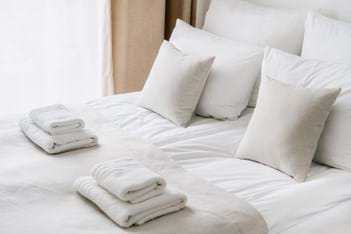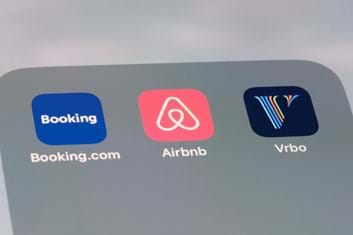It’s already the end of the year with warm weather and holidays beckoning. Many families choose to use the extended summer break to go abroad which can make for wonderfully enriching experiences. But staying closer to home and avoiding jet lag also has its advantages. Perhaps you’re even lucky enough to simply pack up and head to your very own weekender or holiday house.

There are a number of benefits that come with investing in a holiday home. It’s not always financially lucrative, but careful investment and a carefully targeted holiday rental market may result in a profitable and peaceful place to rest your head.
Here are just a few pros and cons to investing in a holiday house.
Pros:
Reduced stress
Your own weekender can help ensure you take regular breaks away reducing stress levels and increasing quality time with loved ones. Having a place set up with familiar essentials for you to relax and replenish your energy can also take the stress out of planning a holiday. You won’t have to pack quite as much to your own weekender as you can leave as much or as little there as you like.
Flexibility
Having your own property means you can visit whenever suits and you have the freedom to invite family and friends to stay too. You could choose to charge rent to family and friends to help cover the costs of maintaining the property or, if it’s financially viable, letting loved ones visit free of charge.
Potential income
To make a weekender a solid investment, make it available as a holiday rental.
Peak seasons will generate the most income and will help offset some of the costs of holding the property such as mortgage repayments. Investing in a property in a popular holiday destination (ideally with demand for accommodation higher than supply) you have the benefit of charging a premium peak rate.
Generally, a holiday rental won’t match the potential income earnings from a conventional investment property as there will be periods of unoccupancy, however it will help cover the overheads of the purchase.
With the outstanding global success of recreation accommodation websites such as Airbnb, more and more people are making their personal weekenders publicly available with much to gain financially. Smaller coastal towns can have good entry level prices yet are still popular holiday destinations. Look for a region with beautiful scenery and a mild climate with easy access to beaches and local attractions as well as plenty of nature.
A solid investment
Ensure your holiday home is good investment and buy in a high demand area with limited accommodation options and close to amenities and local attractions. Ideally your property will also be located close to major centres in an area with a viable and stable local economy. You may be able to claim certain tax deductions applicable to holiday rentals and if you purchase wisely your property may appreciate in value giving you long term capital growth.
A retirement plan
Perhaps your holiday home will become your full-time place of residence in retirement. Investing in a retirement property while you have an income to help pay it off (as well as the potential to earn income from the property before you move in) makes a holiday home purchase a more viable long-term investment. Ensure the property is close enough to shops, a hospital and health or aged care facilities as well as a local community. Consider and maintenance and accessibility factors that might impact you in retirement such as stairs or a large garden.
Cons:
Tenants
If you plan to rent out your holiday home, consider the cost of advertising and marketing such setting up a website (not essential if listed on third party sites such as Stayz and Airbnb). How will you find tenants for periods when you won’t be staying at the property yourself? Keep in mind many holiday destinations rely on a healthy economy and tourism to drive new visitors to the area. These factors can fluctuate over time and may impact the profitability of your investment.
Novelty factor
Perhaps the novelty of having your own holiday home will diminish over time and you won’t want to go to the same place each break. Perhaps you won’t use it as much as you intend, and it becomes a financial (and emotional) burden.
 Bad investment
Bad investment
All property investment involves a level of risk. There is always the chance that a holiday home declines in value rather than appreciating sufficiently to offset the costs of keeping the property.
Costs to consider:
- Mortgage repayments if applicable.
- Advertising and marketing for your holiday home on third party websites, local holiday guides and through local real estate agents.
- Management of the property. Either this is something you undertake yourself (if you have the time and understanding of the role) or you outsource this to a real estate agent, holiday letting agent or a property manager.
- Council, water rates and other bills such as electricity, cleaning services, maintenance and repairs. Plus, the expense of furnishing your property.
- Will you need to undertake any renovations? Factor in a higher renovation budget if you plan to market your property as a premium accommodation venue and attract premium rates.
Investing in a holiday home is a significant financial commitment. The best way to make it a rewarding investment is to carefully research the local property market as well as all costs involved before you make a purchase. Ensure you research locations that will give you a healthy rental yield and long-term growth potential.
Buying a property can be overwhelming. Whether it’s your first home or a little weekender Australian Mutual Bank can assist you to act quickly when the right property presents itself. Contact us or explore our website for more details.

Alison Gallagher is a freelance writer, resourcefulness expert and entrepreneur. She has been featured in various publications including Stellar Magazine, Australian Health and Fitness Magazine, and Cleo Magazine. Alison is particularly passionate about sharing practical tips on how to live simply, sustainably and seasonally.






